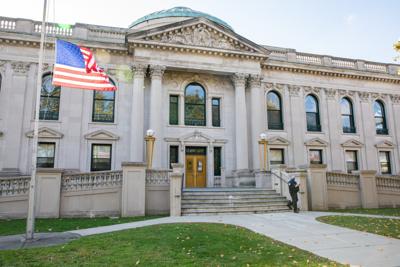The results of the Columbia County Working Families Party case remains uncertain Thursday afternoon after a second day of a hearing Wednesday on 14 consolidated cases.
Appeals for election court cases are due Monday so a decision could be announced Friday.
Lawyers for the petitioners in the 14 cases argued the Working Families party’s certificates of authorization are invalid because signatures were cut and pasted electronically and the certificates were scanned, so local boards of elections did not receive original documents with authentic signatures.
Attorneys for the respondents, including the boards of elections, Working Families Party and candidates, challenged on the certificates, argued the signatures were done legally and the documents comply with election law and Gov. Andrew M. Cuomo’s Executive Order 202.7, which allows notarization processes to take place remotely over video calls because of the COVID-19 pandemic.
Ghent resident Christopher Cornell and Hudson 2nd Ward Supervisor Abdus Miah challenged four local Working Families Party candidates’ certificate of authorization in Columbia County Court earlier this month. Both are represented by attorney John Ciampoli of Messina, Perillo and Hill, LPP, of Sayville. Cornell challenged Ghent town board candidates Mallory Mort, Laurie Johnson and Carl Quinn, and Miah challenged 2nd Ward Alderwoman and Majority Leader Tiffany Garriga.
But Miah said April 15 he intended to bring a complaint to the Columbia County Board of Elections, not to court, against Garriga, who is challenging his supervisor spot.
Miah said he has no connection to Cornell. The two men’s cases were consolidated with 13 other counties in the state. The case questions party official and notary signatures on certificates of authorization, which allow candidates from other parties to run on the Working Families party line.
About 30 candidates are on the certificate in Columbia County.
The notary witnessed the party officials affix their signatures to the documents, according to witness testimonies. The notary signed with a pen, and scanned the document with his signature on it, so the Board of Elections received a scanned copy.
Judge Scott DelConte, a justice of the Supreme Court, 5th Judicial District in New York, from Oswego County, has been presiding over case since it was consolidated. Proceedings on Tuesday and Wednesday took place online through Microsoft Teams.
Daniel Langenbucher and Jonathan Westin from the Working Families party and notary William Sacks testified Tuesday and lawyers presented their arguments Wednesday.
Langenbucher and Westin described the process of signing the certificates of authorization Tuesday, saying they signed a blank piece of paper and showed identification on camera over Zoom and digitally copied and pasted a picture of the signatures onto the certificates of authorization while screen sharing and on camera with Sacks on Zoom.
The petitioners’ attorneys referenced election law 1-106, which is about filing documents, and 6-120, which is about authorizing candidates from other parties. Respondent attorneys rejected the references, saying the laws do not support the petitioners’ arguments.
Attorney Paul DerOhannesian, of DerOhannesian and DerOhannesian, of Albany, representing petitioners in the Dave Knapp v. Christopher Hess, et al., Onondaga County case, said the executive order did not amend the election law, and that election law says original, not scanned copies of documents are needed.
On the other side, Alexander Rabb, of Levy Ratner, P.C., of New York City, in defense of the Working Families party and other respondents, said the election law does not address signing or notarizing, and so a change to the election law was not needed for the signing process to be valid. Rabb said the laws do not say the signatures have to be wet nor describe the notarization process. He emphasized the executive order was about notarizing.
Ciampoli, representing petitioners, said the big question of the case is: “Do they (the certificates) all require original signatures or at least original documents?”
Ciampoli said election law is not affected by the executive order, and that while the notarization process could be altered by the governor, the filing process of the documents remains the same, pointing to the document being scanned instead of the original being provided to the board of elections.
DerOhannesian questioned where the original signed documents were. He said the notary testified Tuesday that the original documents are in his apartment, not with the board of elections.
Ciampoli pointed to a decision by the New York City Board of Elections that a document in a similar scenario was deemed unoriginal and void, saying the local board of elections could have done the same.
Rabb said the New York City Board of Elections’ decision is not binding. The local board of elections upheld every document provided by the party.
DelConte said there may be other political factors going on in New York City that the court is unaware of, agreeing the city’s board decision is irrelevant. DelConte referenced a statement from the state Board of Elections in March 2020 that warned document signatures will look different this year because of the executive order allowing for remote notarizing.
Ciampoli argued the filing of unoriginal documents with signatures displayed by printer toner, not pen ink, and are transferred through fax, opens the door to fraud.
Adam Kleinberg, a respondent lawyer in the Putnam County case, said a printer used for the signatures was a non-event and that the notary upheld its purpose, just using new technology, saying the party didn’t sign with a “quill pen.” Ciampoli said the filing of non-original documents is a decision of legislators and not the court. He said nothing prevented the party from providing an original document and that the party disregarded election law.
Westin said Tuesday the party officials used Zoom video chat and screen share to sign the documents because of the ongoing COVID-19 pandemic.
The court on Wednesday discussed whether various relevant individuals from different counties may not have been notified properly of the hearing.
There is no date set for another hearing on the case as of Thursday morning, according to DelConte’s chambers.









